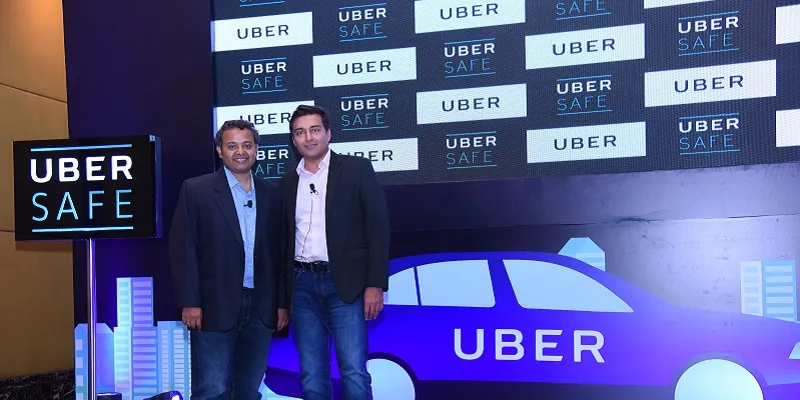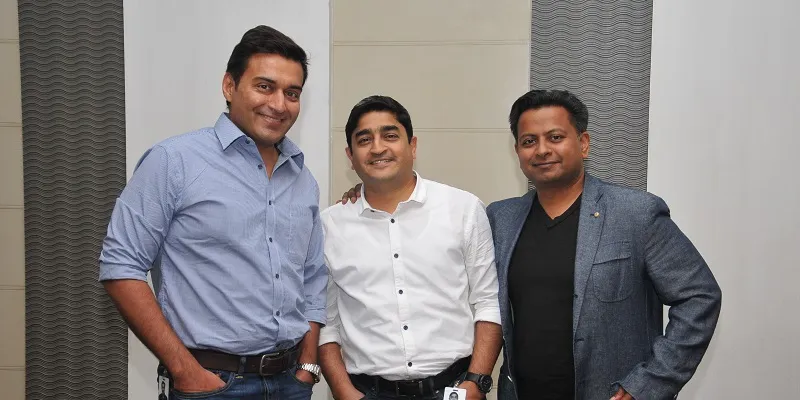[Techie Tuesday] The serendipitous yet super-Uber journey of Apurva Dalal
This week, we feature Apurva Dalal, Head of Engineering at Uber India, which has given the world superbly successful products like Uber Cash and Uber Lite.
For Apurva Dalal, Head of Engineering at Uber India, success is about the impact he creates – be it in developing exciting tech products with a global appeal, building large teams from scratch, or mentoring engineers into larger, more challenging roles.
Apurva comes from a Gujarati family in Mumbai that has run businesses for generations. Not surprisingly, everyone, including his grandmother, expected him to become a businessman, just like the rest of his uncles and cousins.
And like in any other business family, Apurva spent his holidays at the family’s workplace.
“There was no air conditioning or anything, and I could not imagine myself doing that for the rest of my life,” recalls Apurva. “But I learned a few important things there. The main thing was the value of hard work. They worked – and my father still does – day and night, practically six-and-a-half days a week.”
Once he decided he wasn’t going into business, Apurva chose to study engineering, something that nobody else in the family had ever done. He was doing well at school in science, with maths being his strongest subject. Much of his family was unhappy, but his father – who had worked first and then started a business – backed him.
That was just the first step. While his first choice was electrical engineering, Apurva got computer science instead.

It all started for Uber's Apurva Dalal when he chose to study engineering, something that nobody else in the family had ever done.
Hooked by code
Dismayed that he had not got the specialisation of his choice, he tried hard to make the switch to electrical engineering, but to no avail.
“In fact, I struggled to clear my first semester. While my family was wondering what I was doing studying engineering, I was wondering what I was doing in computer science,” he chuckles.
However, when Apurva finally began writing his own code, he was hooked for life. He says, “It is just a complete wonder when, for the first time, you write a simple program and you see that you can have this machine following (your) instructions and doing what you're trying to make it do. I knew this was going to be hard work, but I was fascinated by what you can make computers do.”
There was no looking back. He did an internship at IIT-Bombay, and then, much against his grandmother’s wishes (to at least start a computers-related business!), he joined IT company CMC (now a part of the TATA Group under TCS), which then handled prestigious accounts like the Indian Railways and the Bombay Stock Exchange (now BSE).
The case for experimentation
Says Apurva, “It’s a cliche, but being at the right place at the right time and being lucky is underestimated. Sometimes you can be very, very good, but things may not work in your favour. Like my getting into engineering. I could have very well today be working with one of my uncles, in some business in Mumbai.”
The one thing he credits his success – though he is far too modest to call it that – to is experimentation. While handling a major account at CMC he got a crash course in banking because the client was a major financial services firm and he had to hit the ground running.
Later, he shifted to Uniface programming, a development and deployment platform for enterprise applications that can run in a large range of runtime environments, including mobile, mainframe, web, service-oriented architecture, Windows, Java EE, and .NET.
That move gave him an opportunity to move to Austin, Texas, to work on an IBM project that involved a floor automation system around the RISC System/6000. While initially reluctant to leave Mumbai, he finally left with the full backing of his family who told him he could return any time he wanted if he didn’t like it in the US. “My parents were a pillar of support,” he recalls fondly.

Apurva Dalal along with Pradeep Parameswaran, President, India & South Asia at Uber, at an event
A new work culture
Working in the US gave Apurva tremendous exposure not just to a new society but also a new type of work culture.
“There were a lot of researchers and very strong senior people who I could look up to as role models. One of my managers had a double master’s and was a researcher. Working with her was all about learning constantly. When I saw people like her, I was like, ‘I want to be like them’.”
In India, he didn’t have such role models. The work atmosphere in Austin prompted him to think bigger. “I began asking myself, ‘How can I deliver bigger outcomes?’ I knew I always wanted to be an engineer, but I also wanted to start learning about how to lead teams.”
He then made up his mind to become a business leader but not leave his work in computer science and technology. Having zeroed in on an executive MBA course from the University of Dallas, he juggled lessons and assignments with the demands of a full-time job.
“I enjoyed it more than my engineering because it's just so much more challenging,” he says.
He was exposed to real-time problem-solving and learned how companies are built from a financial perspective. It gave him a new appreciation of his family of Gujarati business folks.
Apurva soon shifted to the Bay area, working for WebMD, where he was part of a project to digitise a vast quantity of paper-based healthcare-related documentation on the cloud. The way the documentation was done didn’t help the functioning of doctors, patients, and insurance companies, he points out. “It was a real challenge to put everything on a readily accessible cloud.”
He was responsible for teams building an online benefits enrollment service implemented on an n-tier CORBA architecture.
There was also the added challenge of how expensive the area was. “For the price I paid to rent an apartment, I could have rented a mansion back in Dallas!” he recalls. It was enough to make him second-guess the move, but things eventually worked out.
Honing his skills
Then came a stint at eBay, where Apurva gained a lot of experience around leadership management while leading product development and the architecture of eBay’s search/browse technology stack. The big outcome there was scaling the search engine server infrastructure – from 28 million searches a day across seven million items in 2001 to 400 million searches a day over 100 million items across 33 sites in five years.
“All these helped mould my career, both as a technologist and as a leader,” he says. It is what led Google to snap him up as Tech Lead Manager for AdWords Reporting at their Mountain View headquarters in California. A year down the line, Apurva’s career path led him back home when Google wanted to set up an engineering centre in India. That was almost a decade ago.
Apurva feels he came to India at exactly the right time. The move was cushioned by the option of moving back the US if things didn’t work out to his liking. But he liked the scene in India so much that he didn’t return, even though he still calls the US his second home.
Learning all the time
The environment of the Google Engineering Centre was just like that of a startup, he says. It was a great learning experience – setting up two engineering centres, seeking and hiring the best talent available in the market.
“What I learned is that when you set up such engineering centres, similar to a startup, you need to have a foundational team that can mentor and groom younger engineers. These engineers are very, very sharp. If you just start with a big team of people, you will face the problem of what to do with people who have just come out of college,” he explains.
On his watch, the Hyderabad cloud computing R&D centre became Google’s largest cloud computing engineering centre. He led engineering across 20+ projects, building core products/platform with a focus on cloud computing.
After over six years, Apurva felt that his learning wasn’t progressing at the pace that he wanted, probably because he had been working in large companies for several years.

Apurva Dalal with the tech team at Uber
Paradigm shift
That’s when he made a move that few would have dared to. He joined an Indian startup called Komli Media as CTO. There, he worked hands-on on design, development, and deployment of a real-time-bidding-enabled ad tech platform.
“It was a totally different experience. Since it didn’t have the backing of a large infrastructure, it was like running your own company,” he says.
He got to travel across Asia and get a feel of the markets there. Three years later, in search of more learning, he moved to Urban Ladder as CTO, where he learned a lot about ecommerce. Apurva made the switch to Uber India in July 2016. It was at a time when the market was still relatively small. And it is here that he had the opportunity to work on another set of world-class solutions built from India, for the world.
The journey with Uber
When he was hired at Uber India, his mandate was to set up an engineering centre. “I am extremely excited to be part of solving the transportation problems of the world. In fact, San Francisco trusts us, here in India, to have a better vantage point for emerging markets. Uber India is really making an impact on the rest of the world. India’s biggest cultural norm is: think global, act local,” he points out.
“Uber as a company is very hungry for innovation, we still think and work like a startup. What keeps us up at night is thinking about the big problems in transportation and how do we solve them?”
One of the things that Uber India is now famous for, was insisting on adding the option to pay in cash. When Uber first came to India, users had to register with their credit card details. Providing an option to pay in cash went against the whole idea of Uber, which was to eliminate friction in the transaction (of finding and completing a ride).
“We persuaded HQ to discuss the matter by providing data points that it would be able to expand in India if passengers were given the option to pay in cash,” he explains. The US-based leadership team agreed, possibly because of the potential size of the market, never expecting it to be used in any other market.
“Today (the) cash (option on the Uber app) is used in so many cities around the world,” says Apurva, adding, “Even in developed cities, there are a lot of first-time riders that just pay by cash. It should be all digital, but it’s not. It’s very satisfying to hear what you build for India is now globally accepted.”
Another thing that came out of India is Uber Lite, an app that takes up less space (under 5 MB) and works even in low, 2G connectivity. Again, even this will work anywhere in the world, especially in emerging markets or any place in the world where connectivity is an issue.
Focusing on innovation
Apurva is on the lookout for such innovations in the future too. Something like Uber Air, he laughs, would work much better than a self-driving car in Bengaluru – infamous for its mind-numbing, spine-stiffening traffic snarls.
In many ways, being at Uber India has been like what his grandmother told him to do all those years ago: start his own business. The journey, he says, has been very much like setting up a startup - the way it has grown, innovated, and shown direction to the rest of the world.
Apurva likes the fact that despite all this, Uber India is still hungry and wants to solve even more problems. “It’s more about quality than quantity. (Uber India) started off as a small team and remains nimble even today. I find that when I empower my engineers, I get fantastic results. Sometimes, even newcomers give you a totally fresh approach. Sometimes, it’s better to solve a problem holistically rather than quickly.”
The millennial mindset
While millennials are a much-maligned generation the world over, Apurva is all for their sense of purpose: “I want them to do very well in their careers. They can learn a lot from my mistakes, but I can also learn from them. The global mindset has changed, and millennials are super smart. For them, the value of time is also quite different.”
He talks about how a young engineer came up to him and said he didn’t want a promotion. Instead, he wanted to spend time honing a particular skill, because that is what excited him.
“I wish I had that kind of excitement when I was young. The rat race is no longer true with these folks.”
Apurva has stayed true to the mantra of hiring people smarter than himself. Early on in his career as a manager, he learned how fresh young talent can sometimes solve some of the biggest problems by taking a step back and looking at it holistically. It’s something he does even now when he faces similar challenges.
It is why the foundations they laid in 2016-17 are now paying off in a big way. “Today, there are nearly eight big teams that are solving a whole host of issues,” he says.
“At Uber, I truly feel that there is so much more we can solve in transportation for billions of people…It’s about impact. It will come in the form of products that we build and the technologies that you help grow.”
Creating impact
Apurva says he’s at a point in his career where he wants to give back, coaching younger engineers to achieve their potential as fast as possible. “In fact, when people leave, I tell them that they’d better make me proud wherever they go.”
He’s also deeply interested in how startups are using technology to create real social impact. He is also an angel investor and advisor for AI-based visual and image search platform Snapshopr. “I wish I could manage my time better and do more with startups,” he laughs. The Gujarati knack for, and attraction to, building businesses remains.
On a lighter note, Apurva narrates how – when he first landed in Texas – he found an apartment close to his office and in true Indian style, decided to walk to work. Unfortunately, this meant crossing a highway, which people there found both amusing and outrageous. Some thought he was a bum!
“Everyone told me, get a car – this is Texas, oil country. Everyone has a car,” he recalls. He did so eventually, settling into the American lifestyle.
Today he works for the world’s largest cab service with more than a 100 million users completing tens of millions of trips every day, worldwide! His parents may still not know the nitty gritty of what he does, but are proud of his success.
On his part, Apurva too sometimes wonders how a kid who never went out of Andheri West has travelled so far.


![[Techie Tuesday] The serendipitous yet super-Uber journey of Apurva Dalal](https://images.yourstory.com/cs/2/a9efa9c0-2dd9-11e9-adc5-2d913c55075e/Apurva-dalal-800x4001561375907833.png?mode=crop&crop=faces&ar=2%3A1&format=auto&w=1920&q=75)
![[Techie Tuesday] Meet VMware’s first woman software engineer who now helms the tech platforms t...](https://images.yourstory.com/cs/2/a9efa9c0-2dd9-11e9-adc5-2d913c55075e/Jenifer_Anderson_TechieTuesdays_2-011560176967790.png?fm=png&auto=format&h=100&w=100&crop=entropy&fit=crop)
![[Techie Tuesday] From building India’s first supercomputer to finding a non-invasive way of det...](https://images.yourstory.com/cs/2/a9efa9c0-2dd9-11e9-adc5-2d913c55075e/Techie-Tuesday-Geetha-Manjunath1560780626901.png?fm=png&auto=format&h=100&w=100&crop=entropy&fit=crop)








